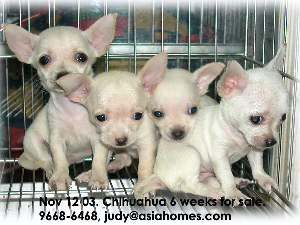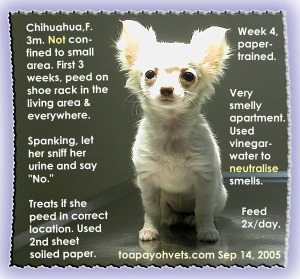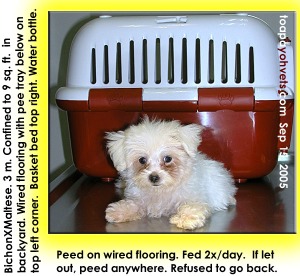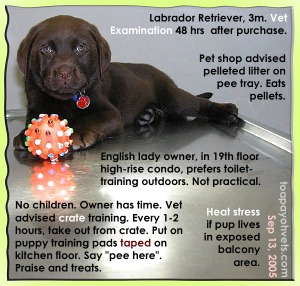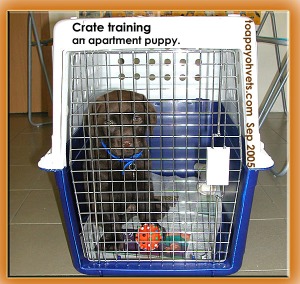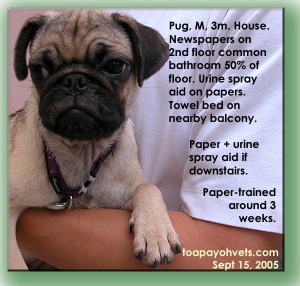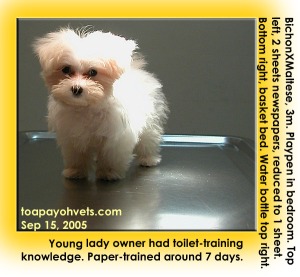 TOA
PAYOH VETS TOA
PAYOH VETStoapayohvets.com Date: 30 January, 2009 |
|
||||||||||||||||
|
|
|||||||||||||||||
|
|
|
|
|||||||||||||||
|
|||||||||||||||||
First case recorded: 16 September 2005
|
|||||||||||||||||
|
How to paper-train a puppy living in
an apartment (6-20 weeks) Toilet training your apartment puppy starts immediately using praise and rewards rather than punishment. Paper-training is common in Singapore as the majority of the population lives in apartments. Toa Payoh Vets Research Report - survey & feedback from over 500 puppy owners at Toa Payoh Vets from 2004-2009. Many first-time puppy owners seldom know how to toilet train their puppies in a positive manner so that both the puppy and the owner feel good. The puppy is free to roam the whole apartment. Newspapers are put on the floor or on top of a tray (if the owner has bought a cage, see picture). But the puppy urinates and passes stools everywhere, except on the newspapers. The owner grumbles that the smelly toilet training aids bought from the pet shop is useless! The puppy gets scolding or beatings. 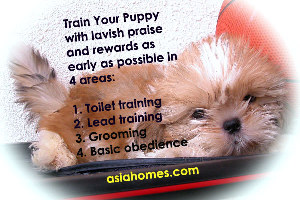 This gold and white 8-week-old Shih Tzu puppy wags its tail every time it sees people and is very attractive to senior citizens. The owner and family members are angry. The puppy is afraid and either runs away or growls (if it is a dominant puppy). The puppy ignores the newspapers placed on the floor because it has no association of relieving itself on newspapers. Most puppies sold by Singapore pet shops & breeders have been confined in a small area, on wire flooring in cages and have never contacted newspapers. Here is ONE method of toilet training the puppy for first-time apartment puppy owner. 1. CONFINED AREA FOR 2-4 WEEKS. Keep the puppy confined in the play pen (exercise pen), crate (wire or fibre-glass cage) or small area (kitchen, outside toilet, balcony fenced up by a gate) for most of the time in the first 4 weeks unless supervised closely by people or after play and eating. 2. 100% NEWSPAPER COVER. Cover the whole floor of the play pen, balcony or crate (cage made of fiberglass or wire) with newspapers. Put some drops of the toilet training aids on one spot of the newspaper. Buy a crate large enough for the puppy to sleep and pass stools if you do not buy the play pen.  A new pet owner complained that the puppy had been trained to pass stools onto the newspapers at the pet shop but refused to do so at home. Actually, the newspapers were placed below the wire flooring on a tray. Therefore, the puppy had no toilet training on newspapers at the pet shop. Most pet shops display puppies for sale in cages with wire flooring and no newspapers. If newspapers are used, they are placed onto the tray below the wire flooring. 3. OBSERVE THE SIGNS. When the puppy circles, moves forward and backward, whines or sniffs around, it wants to urinate or defaecate. Say to the puppy "Pee here" JUST BEFORE it has relieved itself. Use any word you like. "My puppy is always sniffing," one owner said to me when I mention sniffing. There are other signs as well. 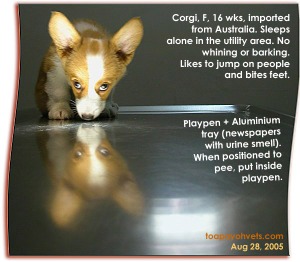 5. LAVISH PRAISE AND/OR REWARDS. After it has relieved itself, give it a small treat and say in a HAPPY voice "Good dog". This method is called positive reinforcement and can be very effective. 6. REPLACE THE SOILED PAPERS PROMPTLY. Soon, you will note that it will choose one spot to relieve itself as it wants to keep its sleeping, drinking and eating area clean. It may whine or bark to request you to remove the soiled papers. 7. GRADUALLY REMOVE THE NEWSPAPERS (e.g. 20 cm by 20 cm per day) till the newspaper covers only the area the puppy uses to relieve itself. Give the puppy a towel to sleep on but it usually chews the cloth. Give it one good quality chew toy when it is confined. Position the puppy's confined area near to human activity to get the puppy used to people. Use the 2nd sheet of the soiled newspapers for other locations if you let the puppy out to play. It may have no time to rush to the original toilet area. Your playpen must be opened up if your puppy had been toilet-trained in the playpen. 8. BIGGER CONFINED AREA. When the puppy is paper-trained, put newspapers outside the confined area when you want to play with the puppy. Once it shows signs of wanting to pass stools, bring it to the newspaper and say "Pee here". When the puppy pees onto the papers, say "Good Pup" and give a puppy treat. Instead of saying "Good Pup" use a CLICKER give a puppy treat. After some training, the puppy feels highly motivated to do what you want him to do in order to get praises, food treats or a time to play with the owner.
The puppy may want to relieve itself on the
newspapers in the play pen, cage or balcony. You or your parent may
need to carry the puppy from the bigger confined area to the
newspapers inside the play pen, cage or balcony initially. 3. BEAT THE PUPPY AND MAKE IT SMELL ITS OWN STOOLS/URINE. Some Singaporeans use their hand or a rolled-up newspaper to beat the puppy when it has passed stools all over the apartment as this has been advised by friends. Some force the puppy to smell the stools/urine and then bring it to the newspaper to tell it to relieve itself there. The puppy runs away in fear. Some growl at the disciplinarian in self defence. The puppy does not know why it is pushed to smell its own stools or yelled at and associate the person with unpleasant feelings and fear. This method is called negative reinforcement. |
4. FAMILY CO-OPERATION. Toilet training needs every
member of the family to supervise the puppy and give the same commands. If
"pooh" is used and another family member say "shit", the puppy gets
confused. If newspapers are used and some members bring the puppy to the
grass, the puppy gets confused too. 5. BUSY WORKING COUPLES. Evenings and weekends may be needed to toilet train the puppy. They will find that the newspapers have been chewed up and in a mess when they return from home. Do not be angry. Clean up the mess and start training. It will be good if the new owner can buy the puppy over the weekend, take leave for a few days to train the puppy. If not, persist in paper training and most puppies will usually be toilet trained in 3 weeks. 6. YOUNG CHILDREN. Unfortunately, young children play with the puppy for long hours. Explain to the children the need for confinement. The puppy also needs a peaceful area to sleep. With too many children and family friends to disturb him, he has no time to rest and no routine to poop after eating. So he also poops at various times after eating instead of once after eating. The owner gets fed up with having to clean up the stools, blaming the puppy for being so stupid. 7. RUGS AND CARPETS. If you can't stand the puppy whining on its first night alone disturbing the neighbours, you can place the crate or play pen in your bedroom. If the puppy sleeps on your bed, provide a rug on the floor. The puppy loves to relieve itself on soft rug. It does not want to dirty your bed. Place more rugs outside the bedroom too. 8. BUYING TWO PUPPIES. The same toilet training procedures apply, with each puppy being confined separately. Most owners house two puppies together and this is hard for the cleaner puppy to relieve itself on the same spot in the newspaper when the mate dirties the whole area. 9. OLDER DOG WITH NEW YOUNGER PUPPY. Some young puppies learn from the older dog. However, the older dog may disapprove the young one from using the same toilet area or papers. 10. BIG BREEDS. Golden Retriever puppies are very popular in Singapore and some live in high rise apartments very happily with the owners. Paper-training is possible but the area must be larger than the one page for small breeds. Try not to use negative reinforcement although some Singaporeans get good results using both negative and positive reinforcement. In such cases, they usually give a light spanking on the backside. Heavy spanking on the face had resulted in eye injuries in 2 cases referred to me for treatment. 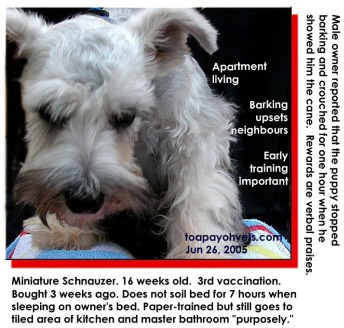 The average puppy less than 20 weeks old is toilet trained after 4 weeks of supervised teaching. Puppies not toilet trained properly may suffer from beatings and given away to the animal shelter as it grows older. Over 90% of the dogs are euthanased when they are given to the shelter. TOILET TRAINING must be a fun experience for the puppy and for the owner. Control your anger when the puppy has not been obedient. Train 3-6 times a day for a few minutes as the puppy becomes bored with lengthy training sessions. Extracts from the Be Kind To Pets Book 2008: Toilet-training Your First Puppy In Singapore. Dr Sing Kong Yuen, BVMS (Glasgow), MRCVS. It may not be possible for me to discuss in detail during consultation hours and I hope the website and over 450 cases of toilet-training by Singapore residents will give the first-time puppy owner a good idea on what to do. Some toilet-training information below for first-time puppy owners:
|
|
Toa
Payoh Vets Clinical Research |
Copyright ©
Asiahomes Internet
All rights reserved. Revised: January 30, 2009
Toa
Payoh Vets
